It has been a week since Liberia’s presidential elections; during that time, the pervasive peace on election day has given way to opposition's claims of electoral fraud as well as a few incidents of violence including two cases of arson and an attack on a prominent radio host. While the overall atmosphere remains relatively calm, recent events are a reminder that the days after an election are just as critical and worthy of observation.
[caption id="attachment_5871" align="aligncenter" width="500" caption="UP headquarters in Paynesville burned"]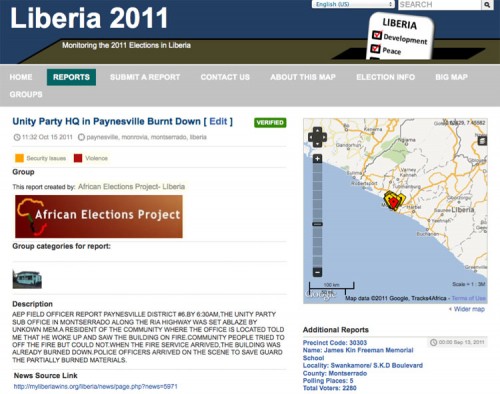 [/caption]
In the last week, the Ushahidi elections instance has also been updated with new features. As of last Friday, the instance has been upgraded with latest version of the Ushahidi platform, version 2.1 (Tunis). One of the most exciting features of 2.1 is the Powerful Reports Filter that allows users to quickly sort through reports according to certain dates and categories, verification, media, location and more.
[caption id="attachment_5872" align="aligncenter" width="500" caption="The new Density Map Plugin"]
[/caption]
In the last week, the Ushahidi elections instance has also been updated with new features. As of last Friday, the instance has been upgraded with latest version of the Ushahidi platform, version 2.1 (Tunis). One of the most exciting features of 2.1 is the Powerful Reports Filter that allows users to quickly sort through reports according to certain dates and categories, verification, media, location and more.
[caption id="attachment_5872" align="aligncenter" width="500" caption="The new Density Map Plugin"]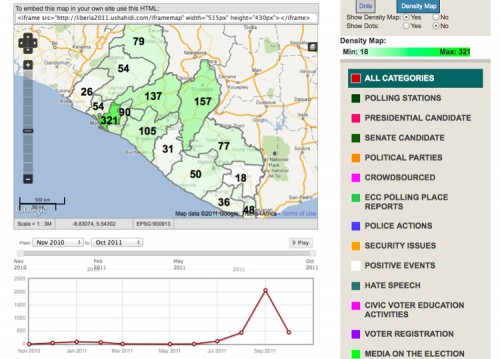 [/caption]
Another new feature on the instance is Ushahidi’s first Density Map plugin by John Etherton. Located on the right side of the homepage, just above the categories, the Density Map option makes it easier to separate reports by geographic region – in this case, by county. All reports that have been associated with a particular county will show up using the Density Map. This feature was requested by UN OCHA as well as other local partners, and serves as a small step towards making the Ushahidi platform a data analysis tool.
[caption id="attachment_5873" align="aligncenter" width="500" caption="ECC data operators at iLab "]
[/caption]
Another new feature on the instance is Ushahidi’s first Density Map plugin by John Etherton. Located on the right side of the homepage, just above the categories, the Density Map option makes it easier to separate reports by geographic region – in this case, by county. All reports that have been associated with a particular county will show up using the Density Map. This feature was requested by UN OCHA as well as other local partners, and serves as a small step towards making the Ushahidi platform a data analysis tool.
[caption id="attachment_5873" align="aligncenter" width="500" caption="ECC data operators at iLab "]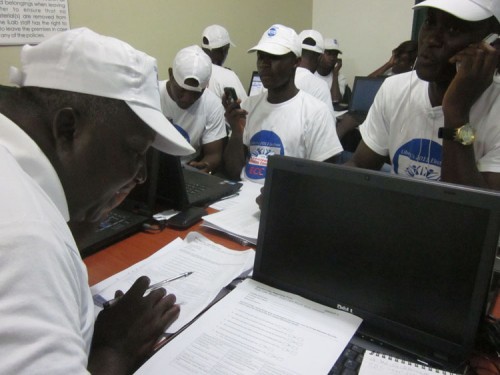 [/caption]
The Elections Coordinating Committee, based at iLab Liberia during the last week, has been compiling detailed reports from monitors at each of the country’s nearly 4,500 polling places; these are being uploaded to the elections instance and can currently be found under the category, “ECC polling place reports”. The National Elections Commission (NEC) has released preliminary results during the last week that can now be found as layers on the elections instance (go to “other layers” section under the categories listing).
The Ushahidi Liberia team was curious about who was looking at the elections instance, how they got there, and where in the world they were sitting when they looked at it. After studying our instance’s Google Analytics, we found that in the last week the map has received 3,533 unique visitors that spend an average of 3 ½ minutes perusing its contents. Interestingly, more than half of this traffic is routed via the Liberian Observer, a national newspaper popular on the ground and online. The majority of the traffic came from the United States (not surprising considering low Internet penetration in Liberia), but what peaked our interest was where in the States: Minnesota, Pennsylvania, Maryland, New York, Georgia – states with the large Liberian Diaspora communities.
[caption id="attachment_5874" align="aligncenter" width="500" caption="Elections instance viewers in the US (graphic via Google Analytics)"]
[/caption]
The Elections Coordinating Committee, based at iLab Liberia during the last week, has been compiling detailed reports from monitors at each of the country’s nearly 4,500 polling places; these are being uploaded to the elections instance and can currently be found under the category, “ECC polling place reports”. The National Elections Commission (NEC) has released preliminary results during the last week that can now be found as layers on the elections instance (go to “other layers” section under the categories listing).
The Ushahidi Liberia team was curious about who was looking at the elections instance, how they got there, and where in the world they were sitting when they looked at it. After studying our instance’s Google Analytics, we found that in the last week the map has received 3,533 unique visitors that spend an average of 3 ½ minutes perusing its contents. Interestingly, more than half of this traffic is routed via the Liberian Observer, a national newspaper popular on the ground and online. The majority of the traffic came from the United States (not surprising considering low Internet penetration in Liberia), but what peaked our interest was where in the States: Minnesota, Pennsylvania, Maryland, New York, Georgia – states with the large Liberian Diaspora communities.
[caption id="attachment_5874" align="aligncenter" width="500" caption="Elections instance viewers in the US (graphic via Google Analytics)"]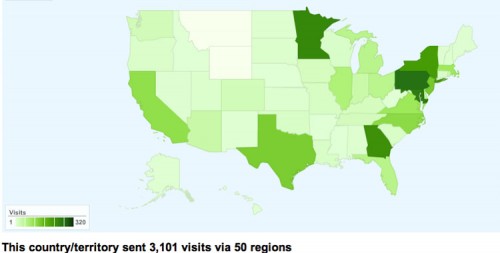 [/caption]
This was our team’s first indication of the Diaspora’s engagement with the electoral process from abroad (not to say there haven’t been many), and it widened our perspective on the instance’s audience. Perhaps, in a country without much local Internet access, it cannot be simply stated that a tool like Ushahidi is irrelevant. In today’s world, a country’s borders extend far beyond political boundaries, and interactive mapping tools such as the Ushahidi platform start to reveal the interconnected webs that criss-cross our globe.
This evening, the NEC announced that 99.9% of the presidential votes have been collected; with no clear winner, Liberia faces a run-off election on November 8th. The first round saw an impressive voter turnout rate of more than 70% (of registered voters), making many hopeful that Liberians will come out in full-force next month. The Ushahidi elections instance will continue to track the electoral process for Liberians at home and abroad, and for all of us who care deeply about the outcome of this country’s first self-run democratic election.
[caption id="attachment_5875" align="aligncenter" width="500" caption="Liberians waiting to vote on election day"]
[/caption]
This was our team’s first indication of the Diaspora’s engagement with the electoral process from abroad (not to say there haven’t been many), and it widened our perspective on the instance’s audience. Perhaps, in a country without much local Internet access, it cannot be simply stated that a tool like Ushahidi is irrelevant. In today’s world, a country’s borders extend far beyond political boundaries, and interactive mapping tools such as the Ushahidi platform start to reveal the interconnected webs that criss-cross our globe.
This evening, the NEC announced that 99.9% of the presidential votes have been collected; with no clear winner, Liberia faces a run-off election on November 8th. The first round saw an impressive voter turnout rate of more than 70% (of registered voters), making many hopeful that Liberians will come out in full-force next month. The Ushahidi elections instance will continue to track the electoral process for Liberians at home and abroad, and for all of us who care deeply about the outcome of this country’s first self-run democratic election.
[caption id="attachment_5875" align="aligncenter" width="500" caption="Liberians waiting to vote on election day"]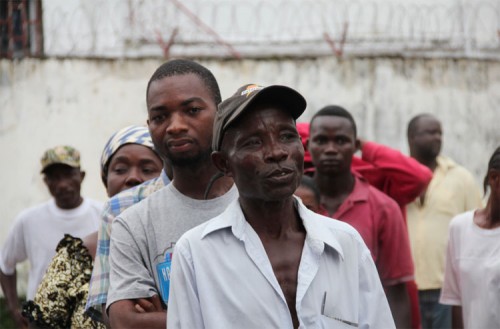 [/caption]
[/caption]
 [/caption]
In the last week, the Ushahidi elections instance has also been updated with new features. As of last Friday, the instance has been upgraded with latest version of the Ushahidi platform, version 2.1 (Tunis). One of the most exciting features of 2.1 is the Powerful Reports Filter that allows users to quickly sort through reports according to certain dates and categories, verification, media, location and more.
[caption id="attachment_5872" align="aligncenter" width="500" caption="The new Density Map Plugin"]
[/caption]
In the last week, the Ushahidi elections instance has also been updated with new features. As of last Friday, the instance has been upgraded with latest version of the Ushahidi platform, version 2.1 (Tunis). One of the most exciting features of 2.1 is the Powerful Reports Filter that allows users to quickly sort through reports according to certain dates and categories, verification, media, location and more.
[caption id="attachment_5872" align="aligncenter" width="500" caption="The new Density Map Plugin"] [/caption]
Another new feature on the instance is Ushahidi’s first Density Map plugin by John Etherton. Located on the right side of the homepage, just above the categories, the Density Map option makes it easier to separate reports by geographic region – in this case, by county. All reports that have been associated with a particular county will show up using the Density Map. This feature was requested by UN OCHA as well as other local partners, and serves as a small step towards making the Ushahidi platform a data analysis tool.
[caption id="attachment_5873" align="aligncenter" width="500" caption="ECC data operators at iLab "]
[/caption]
Another new feature on the instance is Ushahidi’s first Density Map plugin by John Etherton. Located on the right side of the homepage, just above the categories, the Density Map option makes it easier to separate reports by geographic region – in this case, by county. All reports that have been associated with a particular county will show up using the Density Map. This feature was requested by UN OCHA as well as other local partners, and serves as a small step towards making the Ushahidi platform a data analysis tool.
[caption id="attachment_5873" align="aligncenter" width="500" caption="ECC data operators at iLab "] [/caption]
The Elections Coordinating Committee, based at iLab Liberia during the last week, has been compiling detailed reports from monitors at each of the country’s nearly 4,500 polling places; these are being uploaded to the elections instance and can currently be found under the category, “ECC polling place reports”. The National Elections Commission (NEC) has released preliminary results during the last week that can now be found as layers on the elections instance (go to “other layers” section under the categories listing).
The Ushahidi Liberia team was curious about who was looking at the elections instance, how they got there, and where in the world they were sitting when they looked at it. After studying our instance’s Google Analytics, we found that in the last week the map has received 3,533 unique visitors that spend an average of 3 ½ minutes perusing its contents. Interestingly, more than half of this traffic is routed via the Liberian Observer, a national newspaper popular on the ground and online. The majority of the traffic came from the United States (not surprising considering low Internet penetration in Liberia), but what peaked our interest was where in the States: Minnesota, Pennsylvania, Maryland, New York, Georgia – states with the large Liberian Diaspora communities.
[caption id="attachment_5874" align="aligncenter" width="500" caption="Elections instance viewers in the US (graphic via Google Analytics)"]
[/caption]
The Elections Coordinating Committee, based at iLab Liberia during the last week, has been compiling detailed reports from monitors at each of the country’s nearly 4,500 polling places; these are being uploaded to the elections instance and can currently be found under the category, “ECC polling place reports”. The National Elections Commission (NEC) has released preliminary results during the last week that can now be found as layers on the elections instance (go to “other layers” section under the categories listing).
The Ushahidi Liberia team was curious about who was looking at the elections instance, how they got there, and where in the world they were sitting when they looked at it. After studying our instance’s Google Analytics, we found that in the last week the map has received 3,533 unique visitors that spend an average of 3 ½ minutes perusing its contents. Interestingly, more than half of this traffic is routed via the Liberian Observer, a national newspaper popular on the ground and online. The majority of the traffic came from the United States (not surprising considering low Internet penetration in Liberia), but what peaked our interest was where in the States: Minnesota, Pennsylvania, Maryland, New York, Georgia – states with the large Liberian Diaspora communities.
[caption id="attachment_5874" align="aligncenter" width="500" caption="Elections instance viewers in the US (graphic via Google Analytics)"] [/caption]
This was our team’s first indication of the Diaspora’s engagement with the electoral process from abroad (not to say there haven’t been many), and it widened our perspective on the instance’s audience. Perhaps, in a country without much local Internet access, it cannot be simply stated that a tool like Ushahidi is irrelevant. In today’s world, a country’s borders extend far beyond political boundaries, and interactive mapping tools such as the Ushahidi platform start to reveal the interconnected webs that criss-cross our globe.
This evening, the NEC announced that 99.9% of the presidential votes have been collected; with no clear winner, Liberia faces a run-off election on November 8th. The first round saw an impressive voter turnout rate of more than 70% (of registered voters), making many hopeful that Liberians will come out in full-force next month. The Ushahidi elections instance will continue to track the electoral process for Liberians at home and abroad, and for all of us who care deeply about the outcome of this country’s first self-run democratic election.
[caption id="attachment_5875" align="aligncenter" width="500" caption="Liberians waiting to vote on election day"]
[/caption]
This was our team’s first indication of the Diaspora’s engagement with the electoral process from abroad (not to say there haven’t been many), and it widened our perspective on the instance’s audience. Perhaps, in a country without much local Internet access, it cannot be simply stated that a tool like Ushahidi is irrelevant. In today’s world, a country’s borders extend far beyond political boundaries, and interactive mapping tools such as the Ushahidi platform start to reveal the interconnected webs that criss-cross our globe.
This evening, the NEC announced that 99.9% of the presidential votes have been collected; with no clear winner, Liberia faces a run-off election on November 8th. The first round saw an impressive voter turnout rate of more than 70% (of registered voters), making many hopeful that Liberians will come out in full-force next month. The Ushahidi elections instance will continue to track the electoral process for Liberians at home and abroad, and for all of us who care deeply about the outcome of this country’s first self-run democratic election.
[caption id="attachment_5875" align="aligncenter" width="500" caption="Liberians waiting to vote on election day"] [/caption]
[/caption]